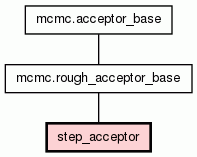__init__(self,
n,
T0,
T=1.0,
maxT=None,
probestep=None,
tau_probe=None,
jitterdroop=None)
(Constructor)
| source code
|
Create a step_acceptor and define it's properties.
- Parameters:
n (int) - How many degrees of freedom should the step acceptor store? Note
that the energy of the step acceptor is gradually equilibrated to
the desired temperature. Each step, there is a 1/n chance of
equibrilating one DOF. So, when n=1, this is exactly a
T_acceptor. When n>>1, the acceptor is very nearly
leak-free, and exchanges energy with the system to be optimized,
but hardly at all with the heat bath. So, for n=1, the
temperature is fixed at T. When n>>1, the temperature can
rise as logP goes up, and will fall when logP goes down.T (float) - What's the temperature of the heat bath? This is the final
temperature that the annealing schedule will eventually approach.
Default: 1.0.T0 (float) - The starting temperature.maxT (float or None) - In optimization mode, it's normal for the system being optimized
to increase it's log(P). That dumps log(P) or `energy' into the
step_acceptor's degrees of freedom and raises
its temperature. This parameter lets you define an approximate
maximum temperature. Setting this may speed up convergence,
though there is a corresponding risk of getting trapped in a
local minimum. - Overrides:
object.__init__
|

